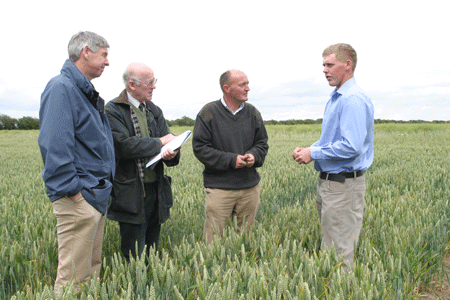FW Awards: Richard Hinchliffe has a passion for cultivation

- Richard Hinchliffe
- Bank House Farm, Rawcliffe Bridge, Goole, East Yorkshire
Having doubled the area farmed with his father and uncle from their base at Rawcliffe Bridge by buying land in 2000, Richard Hinchliffe foresees rising sea level as the main threat to their all-arable business.
Much of the 450ha (1112 acres) consists of warp soils reclaimed from the sea, and he fears the government may eventually regard protecting such low-lying areas as no longer sustainable despite their productive potential.
“Our greatest challenge is climate change,” says Mr Hinchliffe. “We’re quite vulnerable here and the whole place could be under water within my lifetime.”
Expanding the business and abandoning ploughing however made a lot of sense.
It allowed the family to focus on extracting the most, via combinable crops, from the easy-working Grade 1 and 2 silts covering two-thirds of the area and some heavy clay six miles away.
Root cropping was dropped many years ago. “But I’m not against a combinable challenge. We’ve tried crambe, echium and hemp.”
The current rotation is two wheats with breaks of beans, oilseed rape or linseed for local pet food outlet. Target first wheat yield is 12.5t/ha (5t/acre).

“Our second wheats are often nearly as good as our firsts, and anything under 3.5t/acre we regard as very poor.” The soils’ high pH minimises take-all risk, he says. “With rape we aim for 2t/acre.”
Key change on expansion was a switch to non-inversion tillage, lately using a 320hp Challenger 765 on a service contract with a local dealer as the main power source. The other key equipment comprises Simba Horsch Terrano FG and Vaderstad Rexius Twin cultivators and a Horsch CO4 drill.
“Cultivation is my passion, and I don’t think we’d see any more efficiency from machinery sharing,” says Mr Hinchliffe. “We don’t bale any straw, chopping is very important, and we direct drill whenever we can.”
Abandoning the plough saw fuel costs fall by a third.
Short stiff-strawed varieties are particularly sought-after, early information on how well newcomers perform coming partly from BASF trials on the farm.
“We’ve dropped barley and grow Cordiale [wheat] instead for its earliness.”
The variety presented an ideal opportunity to reduce barley volunteers – about a third of his wheat is for seed. But blackgrass (some resistant) remains a problem which the rotation, including its spring cropping, only partially addresses.
“We shall have to use Atlantis on the heavy land for the first time this year.”
BASIS- and FACTS-qualified Mr Hinchliffe does all his field-walking, sourcing inputs mainly from two locally competing suppliers.
As markets become increasingly volatile his policy is to sell more grain forward, through both smaller independent merchants and larger national firms. “We know what margin we’re happy with, and if we can’t see it we won’t sell.”
A recently built 1000t on-floor store has increased his sales’ flexibility.
Part of the BASF trials work is exploring the biodiversity impact of varying management on seeds mixtures intended to encourage birds and other wildlife. These include various herbicide treatments.
In theory some of the results could be useful should the farm introduce ELS field margins. “But we don’t really have enough natural features to go into the scheme,” says Mr Hinchliffe.
“Our grassy dykes already contain a lot of wildlife, and I don’t think adding 6m margins would bring a lot extra.
“The ELS was marginal when wheat was £70-80/t, but at £130/t it’s a non-starter.”
WHAT THE JUDGES LIKED
- Richard’s down-to-earth approach as a keen and passionate arable farmer totally committed to his family business
- His sound knowledge of the farms’ soils, their potential and specific cultivation requirements
- His welcome of the challenge of alternative crops and his well thought-out rotation allowing him to cut herbicide costs and remain a seed grower
- His support for biodiversity trials and communicating their results
FARM FACTS
- 470ha family partnership
- Two-thirds Grade 1 and 2 silts, plus heavy clay
- Annual rainfall: 620mm
- Cropping: Wheat, oilseed rape, beans and linseed

